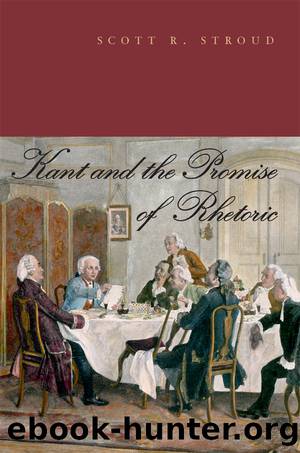Kant and the Promise of Rhetoric by Scott R. Stroud

Author:Scott R. Stroud
Language: eng
Format: epub
ISBN: 9780271064192
Publisher: The Pennsylvania State University Press
Published: 2014-08-15T00:00:00+00:00
Five
__________________
RELIGIOUS EDUCATIVE RHETORIC: RELIGION AND RITUAL AS RHETORICAL MEANS OF MORAL CULTIVATION
It is not disingenuous to say that one needs a certain amount of faith to find a sense of rhetoric in Kant. He produced no textbooks on proper speaking, and as illustrated in previous chapters, his pronouncements on the art of rhetoric are too easily construed as hostile and negative. To a very real degree, one must have faith that there is a sense of rhetoric in Kant to unearth rhetoric in Kant. Otherwise, one simply and quickly dismisses any connection between his thought and rhetoric. Looking for terminological symmetry to complement the relation between faith and rhetoric, could one say that there is an account of rhetoric in Kantâs reading of faith? This chapter extends the previous chapterâs analysis of Kantian educative rhetoric in the realm of faith and religious activity. Kant was an intensely religious man, albeit one infused with a unique blend of pietist sensibilities. He saw religion as an inward practiceâa feature that attracted him to a reading of Christianity as an âinnerâ religion of the heart. His critical sensibilities made him recoil from religious claims being granted the same status as âtheoreticalâ or âtruthâ claims about objects of experience. Instead, religion was akin to the practical. It shaped human activities by offering a vision of hopes and ideals, and it did not replace what could now be called a âscientificâ view of the world of objects and phenomena. Kantâs account of religion has received renewed attention in recent years, but its relevance to rhetoric and persuasion remains unexplored.1 Interestingly enough, Robert J. Dostalâs important early examination of rhetoric in Kantâs system largely avoids the relation of rhetoric to religion. He highlights the problems Kant has with rhetoric qua manipulation and ends by claiming that Kantâs âhope for politics is a moral citizenry,â one that âcannot be answered in the politics or historyâin the polis.â2 He invokes a quotation from 6:95 in Kantâs Religion Within the Boundaries of Mere Reason (1793) to the effect that an ideal community of moral wills depends on the improbable cooperation of actual individual wills.3 The emphasis on the communal in Kantian moral cultivation is a step in right direction, but Dostal simply does not see the relevance of Kantâs account of religion for a Kantian account of rhetoric.
Religion and religious activity are vital for Kant, since they concern the synthesis of two vital features to the morally worthy human lifeâcommunity and moral virtue. As earlier chapters have illustrated, Kantian freedom in its individual and systemic forms requires a certain way of orienting oneself toward others. This way of orienting oneself involves seeing others as fundamentally equal to yourself (per FHE), consistency in willing in relation to othersâ purposive willing (per FUL), and the ideal of a system of such agents following these guides (FKE). Yet, as I have argued earlier, one can force others to act morally only in their external freedom (thus, in a state of external rightfulness).
Download
This site does not store any files on its server. We only index and link to content provided by other sites. Please contact the content providers to delete copyright contents if any and email us, we'll remove relevant links or contents immediately.
The Vikings: Conquering England, France, and Ireland by Wernick Robert(84227)
Ali Pasha, Lion of Ioannina by Eugenia Russell & Eugenia Russell(40255)
The Conquerors (The Winning of America Series Book 3) by Eckert Allan W(37473)
The Vikings: Discoverers of a New World by Wernick Robert(36978)
Cecilia; Or, Memoirs of an Heiress — Volume 1 by Fanny Burney(32558)
Cecilia; Or, Memoirs of an Heiress — Volume 2 by Fanny Burney(31956)
Cecilia; Or, Memoirs of an Heiress — Volume 3 by Fanny Burney(31941)
Empire of the Sikhs by Patwant Singh(23084)
The Secret History by Donna Tartt(19086)
Hans Sturm: A Soldier's Odyssey on the Eastern Front by Gordon Williamson(18590)
Cat's cradle by Kurt Vonnegut(15352)
Pimp by Iceberg Slim(14506)
Sapiens: A Brief History of Humankind by Yuval Noah Harari(14389)
Talking to Strangers by Malcolm Gladwell(13370)
Norse Mythology by Gaiman Neil(13363)
Leonardo da Vinci by Walter Isaacson(13336)
4 3 2 1: A Novel by Paul Auster(12391)
Underground: A Human History of the Worlds Beneath Our Feet by Will Hunt(12097)
The Radium Girls by Kate Moore(12028)
